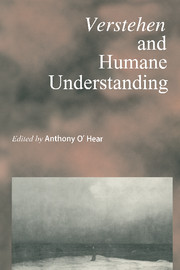Book contents
- Frontmatter
- Contents
- Notes on Contributors
- Preface
- ‘Two Cultures’ Revisited
- Rational and Other Animals
- Vico and Metaphysical Hermeneutics
- Three Major Originators of the Concept of Verstehen: Vico, Herder, and Schleiermacher
- Weber's Ideal Types as Models in the Social Sciences
- Verstehen, Holism and Facism
- Interpretation in History: Collingwood and Historical Understanding
- The Meaning of the Hermeneutic Tradition in Contemporary Philosophy
- Science and Psychology
- To Mental Illness via a Rhyme for the Eye
- Can There be an Epistemology of Moods?
- Feeling and Cognition
- Believing in order to Understand
- Data and Theory in Aesthetics: Philosophical Understanding and Misunderstanding
- Anti-Meaning as Ideology: The Case of Deconstruction
- Perictione in Colophon
- Index of Names
Science and Psychology
Published online by Cambridge University Press: 17 May 2010
- Frontmatter
- Contents
- Notes on Contributors
- Preface
- ‘Two Cultures’ Revisited
- Rational and Other Animals
- Vico and Metaphysical Hermeneutics
- Three Major Originators of the Concept of Verstehen: Vico, Herder, and Schleiermacher
- Weber's Ideal Types as Models in the Social Sciences
- Verstehen, Holism and Facism
- Interpretation in History: Collingwood and Historical Understanding
- The Meaning of the Hermeneutic Tradition in Contemporary Philosophy
- Science and Psychology
- To Mental Illness via a Rhyme for the Eye
- Can There be an Epistemology of Moods?
- Feeling and Cognition
- Believing in order to Understand
- Data and Theory in Aesthetics: Philosophical Understanding and Misunderstanding
- Anti-Meaning as Ideology: The Case of Deconstruction
- Perictione in Colophon
- Index of Names
Summary
I want to ask: what is knowledge of human beings and can it be acquired by experimental methods?
It is a widespread assumption in academic psychology that the methods which have been applied with great success in the physical sciences are applicable to investigations in other areas and hence to psychological investigation. The history of experimental psychology is the history of the adjustments psychologists have made to their subject to be able to apply the experimental method of the sciences to it. In the process of trimming the head to fit the cap on it they have emasculated psychology.
The knowledge they seek in this way—which is the only kind of knowledge they recognize—is impersonal, general, inductive, theoretical. It is to be applied to particular cases so as to obtain an understanding of individual people and help them to deal more efficiently with such problems as difficulties in learning at school, stress at work, problems of maladjustment, unhappiness in relationships, etc. This is the orthodox view.
Thus in a book, entitled Psychology, The Science of Mental Life, George Miller says that advance in a science is measured in terms of theory and of practical results: ‘scientific knowledge provides a foundation for technological advances, for the solution of practical problems that arise in the daily affairs of ordinary people’ (p. 16). This foundation, he tells us, is to be found in the understanding it seeks of ‘what people are really like’ (p. 17).
- Type
- Chapter
- Information
- Verstehen and Humane Understanding , pp. 145 - 164Publisher: Cambridge University PressPrint publication year: 1997



